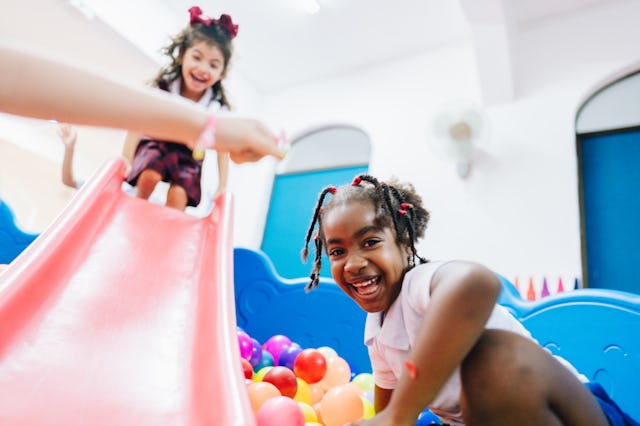This Teacher Thinks “Mean Girls” Exist Because We Don’t Teach Our Daughters How To Speak Up
We’re quick to label girls, but less quick to help them voice their needs.

Growing up as a girl can be amazing: girlhood is full of joy and light and simple fun. Remember how we could entertain ourselves for hours playing clapping games? That’s a kind of magic we created. But girlhood can also be a minefield. From an early age, we’re taught to be and, more importantly, feel responsible for other people’s feelings. To be nice above all things — above our own needs, above what’s right, above even kindness. So if someone wants to play with us, we have to play with them.
We don’t teach girls to speak up on their own behalf, and when they try to navigate being nice and their own wants and needs, they’re labeled “mean girls.” But TikTok user @kbinsea thinks we’re not only unfairly judging girls, but we need to help them do better.
“Girls are not mean,” she says. “They have just been told that they can’t directly communicate who they do and don’t want to spend time with.”
“When we see very young children expressing who they don’t want to be around, we need to teach them to be kind, specific, and honest. ‘Why don’t you want to play with her?’ ‘I don’t want to play with her because she never lets me have any ideas in the game; I don’t want to play with her because she doesn’t have any other friends and she always wants to play with me and it’s exhausting.’”
Who hasn’t been there as a kid? We’re all learning to be people who have relationships with other people. We should always be kind to one another, but that doesn’t mean we have to subsume our needs to accommodate someone else’s comfort. But what does kindness, specificity, and honesty look like in this context?
“Our first step is to take young girls and teach them to use specific language about why they don’t want to be around somebody,” says @kbinsea. “‘Why don’t you want to be around this person? You have the right to communicate what you don’t like about their behavior.’ And then what we need to do is we need to support and back these young girls. We need to say things like ‘She doesn’t want to play with you because you always control the game; she doesn’t want to play with you because you never have any ideas, how can we come up with some ideas to contribute to the game?; she doesn’t want to play with you because you don’t want her to have any other friends.’ We need to teach young children that they are responsible for their behavior and other children are responsible for who they do and don’t play with and we need to support young girls in this.”
This isn’t to say that “mean girls” don’t exist. Sometimes kids, any kid, can be unkind. Some kids can even be routinely unkind. But it’s worth diving into what else we might be observing instead of just dismissing girls as mean because they’re not centering someone else’s emotional well-being ahead of their own.
“I can’t tell you how many times I or other girls in my class got in trouble for ‘excluding’ because we didn’t want to play with everyone all the time,” recalls one commenter. “The boys were never called ‘cliquey’ but we were.”
“My mother forced me to say ‘yes’ to playing with anybody who asked,” says another. “I know she was trying to teach kindness, but in doing so, she taught me my needs come last. I still struggle with saying ‘no.’”
“As the girl no one wanted to play with and has always felt like others don’t want to be around me I would prefer knowing what I’m doing wrong,” a third reflects.
Relationships are weird, even the seemingly simple ones we learn in childhood. But if we teach our kids to speak up for themselves and listen to others as young children, maybe they will be a little bit easier when they’re adults.